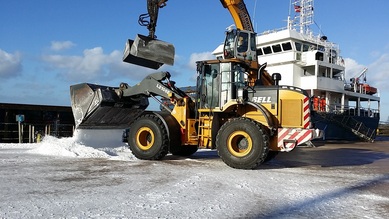
I was at Ineos in Runcorn yesterday, where they process the majority of UK mined salt. The minded salt is processed for treating the roads to putting on your chips and every applications in between.
Ineos has just taken delivery of two Bell 2106 wheel loaders installed with Loadrite Electronic Payload systems (EPS). One of the primary roles for these machines is the bulk loading of salt into cargo ships.
The complexities (and vagaries) of loading ships correctly rely on a huge number of factors. In essence, the amount of cargo (and other loads; fuel, ballast, provisions, crew etc) is related to how low the vessel floats in the water. (Here is a link for anyone curious enough to learn more about it). The suppliers are quite at the mercy of the ships Master to determine how much cargo the ship is loaded with unless they have an independent measure of cargo prior to loading. Error in calculation could be costly. With 5,000 tonnes of salt at £50/tonne. An error of just 1% would represent £2,500. One ship a week at that rate would cost £130K per year.
The Loadrite EPS takes some of the vagaries out of the equation and puts the initiative back with the supplier. Understanding that the ships Master takes ultimate responsibility for the loading of his vessel.
An enhancement to the system would be an upgrade to a Weighs and Measures certified system on the Bell's with remote reporting capability. This would give traceable loading along with other benefits such as loading efficiency. A conversation that I was keen to persue.
Watch this space...
Ineos has just taken delivery of two Bell 2106 wheel loaders installed with Loadrite Electronic Payload systems (EPS). One of the primary roles for these machines is the bulk loading of salt into cargo ships.
The complexities (and vagaries) of loading ships correctly rely on a huge number of factors. In essence, the amount of cargo (and other loads; fuel, ballast, provisions, crew etc) is related to how low the vessel floats in the water. (Here is a link for anyone curious enough to learn more about it). The suppliers are quite at the mercy of the ships Master to determine how much cargo the ship is loaded with unless they have an independent measure of cargo prior to loading. Error in calculation could be costly. With 5,000 tonnes of salt at £50/tonne. An error of just 1% would represent £2,500. One ship a week at that rate would cost £130K per year.
The Loadrite EPS takes some of the vagaries out of the equation and puts the initiative back with the supplier. Understanding that the ships Master takes ultimate responsibility for the loading of his vessel.
An enhancement to the system would be an upgrade to a Weighs and Measures certified system on the Bell's with remote reporting capability. This would give traceable loading along with other benefits such as loading efficiency. A conversation that I was keen to persue.
Watch this space...

 RSS Feed
RSS Feed